
With Thanksgiving this week and the start of the December holiday season around the corner, let’s start talking about cybersecurity for the holidays! For some of us, this means going online and finding the best deals. While for others, this means going to the store and bringing home the best deals. Either way, this is the time of year that many of us make purchases with debit and credit cards. This creates a risk for the consumer and to the small business. How can you protect your small business during the holiday season?
Protecting your business
During the holiday shopping season, consumers are trying to protect themselves from fraud and scams, but a small business also needs to protect themselves from these same threats. Small businesses operate both in store and online, so it is important to protect how you do business. So let’s focus on cybersecurity for the holidays for both brick and mortar stores and for our online stores.
Brick and mortar
Brick and mortar stores have their own unique cybersecurity risks during the holiday shopping season. Small businesses need to be extra cautious about how their Point of Sale (POS) systems connect to their network. Are they easily accessible on the business network? Are they segmented in a more secure network? Another thing to be on the lookout for is card skimmers being applied to your debit and credit card machines.
- Verify the platform you are using for your POS system is fully up-to-date, along with all the software that is on the device
- Check your debit and credit card machines throughout the day to ensure they have not been tampered with
- Make sure you have anti-malware solutions on your POS devices and keep it fully updated
Online sales
Protecting your e-commerce website is key to a successful holiday shopping season. Make sure your website is ready to handle the influx of online purchases. Now is also a good time to ensure your website and any plugins are up to date and that you are actively looking for any weird or unusual activity.
- Verify the platform you are using has the latest updates
- Purchase website plug-ins from trusted sources that use the latest updates
- Use anti-malware on your website to scan for vulnerabilities
- Implement third-party solutions that directly address botnet attacks, remote code execution, and other cyber-attacks
To learn more about the Michigan SBDC check out Who We Are!